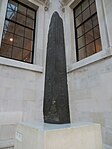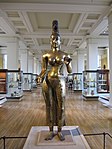Montagu House, Bloomsbury
British MuseumBuildings and structures demolished in 1842Buildings and structures in BloomsburyDemolished buildings and structures in LondonFormer houses in the London Borough of Camden ... and 1 more
Use British English from August 2015

Montagu House (sometimes spelled "Montague") was a late 17th-century mansion in Great Russell Street in the Bloomsbury district of London, which became the first home of the British Museum. The first house on the site was destroyed by fire in 1686. The rebuilt house was sold to the British Museum in 1759, and demolished in the 1840s to make way for the present larger building.
Excerpt from the Wikipedia article Montagu House, Bloomsbury (License: CC BY-SA 3.0, Authors, Images).Montagu House, Bloomsbury
Great Russell Street, London Bloomsbury (London Borough of Camden)
Geographical coordinates (GPS) Address Nearby Places Show on map
Geographical coordinates (GPS)
| Latitude | Longitude |
|---|---|
| N 51.519319 ° | E -0.126933 ° |
Address
British Museum
Great Russell Street
WC1B 3DG London, Bloomsbury (London Borough of Camden)
England, United Kingdom
Open on Google Maps









